Catharism was a Christian dualist or Gnostic revival movement that thrived in some areas of Southern Europe, particularly what is now northern Italy and southern France, between the 12th and 14th centuries. The followers were known as Cathars, or Good Christians, and are now mainly remembered for a prolonged period of persecution by the Catholic Church, which did not recognise their belief as being Christian. Catharism appeared in Europe in the Languedoc region of France in the 11th century and this is when the name first appears. The adherents were sometimes known as Albigensians, after the city Albi in southern France where the movement first took hold. The belief may have originated in the Byzantine Empire. Catharism was initially taught by ascetic leaders who set few guidelines, and, thus, some Catharist practices and beliefs varied by region and over time. The Catholic Church denounced its practices including the Consolamentum ritual, by which Cathar individuals were baptized and raised to the status of "perfect".
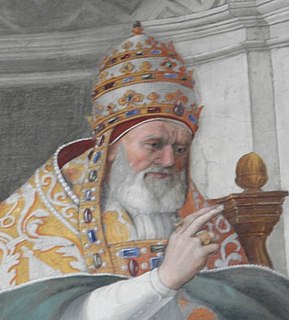
The Medieval Inquisition was a series of Inquisitions from around 1184, including the Episcopal Inquisition (1184–1230s) and later the Papal Inquisition (1230s). The Medieval Inquisition was established in response to movements considered apostate or heretical to Christianity, in particular Catharism and Waldensians in Southern France and Northern Italy. These were the first inquisition movements of many that would follow.

The Albigensian Crusade or the Cathar Crusade was a 20-year military campaign initiated by Pope Innocent III to eliminate Catharism in Languedoc, in southern France. The Crusade was prosecuted primarily by the French crown and promptly took on a political flavour, resulting in not only a significant reduction in the number of practising Cathars, but also a realignment of the County of Toulouse in Languedoc, bringing it into the sphere of the French crown, and diminishing both Languedoc's distinct regional culture and the influence of the counts of Barcelona.

Bogomilism was a Christian neo-Gnostic or dualist sect founded in the First Bulgarian Empire by the priest Bogomil during the reign of Tsar Peter I in the 10th century. It most probably arose in what is today the region of Macedonia.
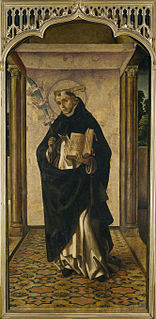
Peter of Verona, also known as Saint Peter Martyr and Saint Peter of Verona, was a 13th-century Italian Catholic priest. He was a Dominican friar and a celebrated preacher. He served as Inquisitor in Lombardy, was killed by an assassin, and was canonized as a Catholic saint 11 months after his death, making this the fastest canonization in history.
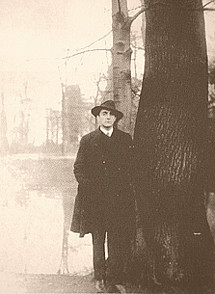
Otto Wilhelm Rahn was a German writer, medievalist, Ariosophist, and an officer of the SS and researcher into the Grail myths. He was born in Michelstadt, Germany, and died in Söll in Austria. Speculation still surrounds Otto Rahn and his research.
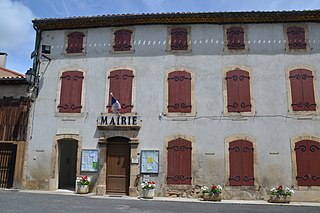
Puivert is a commune in the Aude department in the Occitanie region in southern France.
Nicetas, known only from Latin sources who call him papa Nicetas, is said to have been the Bogomil bishop of Constantinople. In the 1160s he went to Lombardy. His purpose was apparently to reinforce the dualist beliefs of the Cathars of these regions, and, in particular, to throw doubt on the validity of their spiritual lineage or ordo, the sequence of consolamenta by which they were linked to the Apostles.
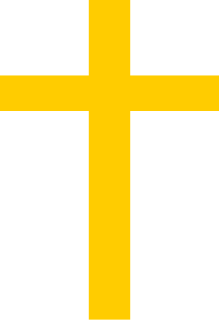
In the Middle Ages, the Cathar yellow cross was a distinguishing mark worn by repentant Cathars, who were ordered to wear it by the Roman Catholic Church.
Perfect was the name given by Bernard of Clairvaux to the leader of the medieval Christian religious movement of southern France and northern Italy commonly referred to as the Cathars. The Perfect were not clerics in any way, but were merely members who had become ‘adepts’ in the teaching, and whose role was that of aiding the ordinary members achieve the rewards of belief and practice - men and women could become Perfecti. The term reflects that such a person was seen by the Catholic Church as the "perfect heretic". As "bonhommes" Perfecti were expected to follow a lifestyle of extreme austerity and renunciation of the world which included abstaining from eating meat and avoiding all sexual contact. By that virtue they were recognized as trans-material angels by their followers, the Credentes. Perfecti were drawn from all walks of life and counted aristocrats, merchants and peasants among their number. Women could also become Perfects; Female Perfects were known as Parfaites or Perfectae.

Caussou is a commune in the Ariège department in the Occitanie region in southwestern France.
Antonin Gadal (1877–1962) was a French mystic and historian who dedicated his life to study of the Cathars in the south of France, their spirituality, beliefs and ideology.
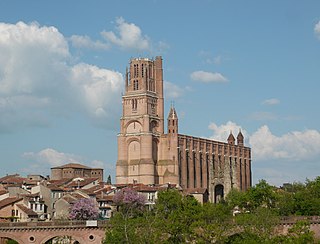
The Cathedral Basilica of Saint Cecilia, also known as Albi Cathedral, is the most important Catholic building in Albi, France and is the seat of the Catholic Archbishop of Albi. First built as a fortress in the aftermath of the Albigensian Crusade; begun in 1282 and under construction for 200 years, it is claimed to be the largest brick building in the world.
Credentes or Believers, were the ordinary followers of what became known as the Cathar or Albigensian movement, a heretical sect which flourished in western Europe during the 11th, 12th and 13th Centuries. Credentes constituted the main part of the Cathar community in the region. Although Catharism sprang up in Spain, the Rhineland, Flanders and Italy its main focus was in the southern region of France, particularly the area known as the Languedoc. Although pacifist in nature, Catharism drew the condemnation of the Catholic Church which, when persuasion failed, launched successive Crusades and instigated the Inquisition to destroy it.
The Militia of Jesus Christ was a military order in Lombardy during the High Middle Ages. It was founded at Parma by Bartholomew, Bishop of Vicenza, a Dominican, in 1233 and approved by Pope Gregory IX, who gave it a rule in 1234 and placed under the jurisdiction of the Dominicans. Its chief purpose was to combat heresy, like Catharism and Waldensianism, and to strengthen the bond between the Roman Church and the local nobility. In imitation of the Order of Santiago, members of the Militia did not take a vow of chastity, nor did they live communally or in poverty.
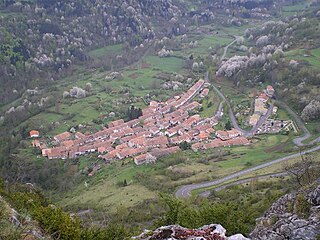
Montségur is a commune in the Ariège department in southwestern France.
Guilhabert de Castres was a prominent Cathar theologian. Born in Castres, he became a Perfect (Parfaits) and, between 1223 and 1226, Bishop of Toulouse in the Cathar Church. In the theological debates in the early 13th century between the Cathars and the Papal representatives, he presented the Cathar arguments, thus at the Debate at Montreal in 1206 and at the last Debate at Pamiers where he encountered Saint Dominic in 1207, prior to the Albigensian crusades.
Saint Pietro Parenzo was a mayor of the Italian Comune of Orvieto during the 12th century. He was assassinated in 1199 by the adherents of Catharism and became honored as a saint and wonderworker after his death. He is the patron saint of the city of Orvieto.
"Caedite eos. Novit enim Dominus qui sunt eius." is a phrase reportedly spoken by the commander of the Albigensian Crusade, prior to the massacre at Béziers on 22 July 1209. A direct translation of the Latin phrase is "Kill them. For the Lord knows those that are His own." Papal legate and Cistercian abbot Arnaud Amalric was military commander of the Crusade in its initial phase and leader of this first major military action of the Crusade, the assault on Béziers, and was reported to have uttered the order by Caesarius of Heisterbach.









